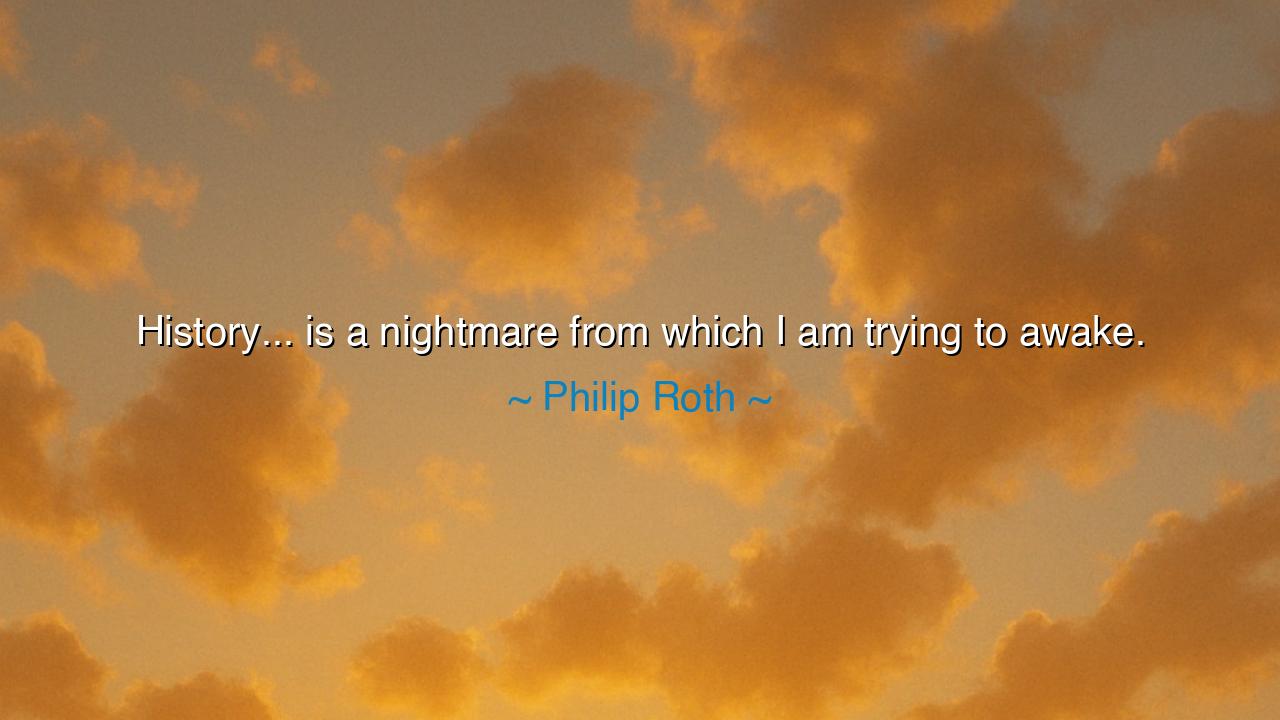
History... is a nightmare from which I am trying to awake.






When Philip Roth, the master chronicler of America’s moral disquiet, echoed the haunting words, “History... is a nightmare from which I am trying to awake,” he spoke not merely as a novelist, but as a man burdened by the weight of memory. His phrase, borrowed from the voice of James Joyce’s Ulysses, carries the anguish of one who has seen how the past never truly dies — how it clings to the present like a ghost that refuses to be laid to rest. In Roth’s reflection, history is not the distant story of kings and wars, but the living shadow of human suffering, replayed generation after generation, written into the bones of every people who have known exile, fear, or guilt.
The origin of this quote lies in Roth’s lifelong struggle to understand the inheritance of identity — especially the inheritance of Jewish history in the modern world. Born to an American generation that had survived the echoes of the Holocaust and the storms of assimilation, Roth carried within him the tension between remembering and escaping. To him, history was not a comfort; it was a burden of consciousness. It was the awareness that every joy, every freedom, stands upon centuries of blood, prejudice, and struggle. In novels like The Plot Against America and American Pastoral, Roth confronted the illusion of safety in a civilized age. For him, the past always lingered just beneath the surface — waiting to rise, as nightmares often do, when one dares to close their eyes.
To say that “history is a nightmare” is to recognize the cyclical nature of human folly. Nations rise and fall; ideologies promise salvation and bring ruin; the same mistakes, dressed in new banners, return to haunt the living. The ancients knew this well. The historian Thucydides, chronicling the Peloponnesian War, wrote that human beings repeat their tragedies because their hearts do not change — their pride, their greed, their fear of the other. Roth’s cry to “awake” is thus not a rejection of history, but a desperate yearning to break free from its fatal repetitions — to awaken into a new consciousness where mankind might finally learn, and not merely remember.
Consider, for example, the Holocaust, one of the darkest nightmares of human history. It was not born from chaos, but from order — from laws, from propaganda, from the machinery of civilization turned against itself. After the war, humanity vowed Never again, yet the seeds of hatred continued to sprout in new soil, under new names. Roth, who wrote in the shadow of this history, understood that the nightmare continues not because men forget, but because they do not awaken — because they dream of progress while still captive to the ancient instincts of division and domination. His lament is both personal and universal: a cry for moral awakening, for the courage to face the truth that evil is not a relic, but a recurring possibility.
And yet, within this despair lies also a call to responsibility. To “awake” from history’s nightmare is not to erase the past, but to face it with open eyes — to refuse the numbness that allows cruelty to repeat itself. Roth teaches us that awareness is the first act of resistance. The man who knows his history cannot be deceived by the repetition of its patterns. To awaken is to become a witness — one who sees clearly, who refuses to sleep through injustice, who carries the burden of remembrance not as chains, but as armor against ignorance.
There is a tale from the ruins of Hiroshima, where a teacher, upon surviving the atomic blast, gathered the remaining children and began again to teach them — even among the ashes. When asked why, she said, “If they forget how to think, the nightmare will begin again.” Such is the spirit of Roth’s cry: that awakening is an act of creation, not despair. The nightmare of history can be transformed only when courage replaces denial, and when the living choose compassion over vengeance, truth over comfort, and knowledge over oblivion.
So, O seeker of wisdom, take this teaching as both warning and light: do not sleep within the comforts of forgetfulness. To be alive is to bear the scars of those who came before — and to refuse their repetition. Study history not as a series of dates and empires, but as the map of the human soul — its heights and its abysses. Question every ideology that promises purity or perfection, for those are the dreams from which nightmares are born. Seek instead to awaken — to see the world as it is, to act with conscience, and to keep watch over truth.
For in the end, Roth’s words remind us that awakening is not an escape from history, but an act of redemption within it. The nightmare will always linger at the edges of our sleep — but each generation has the power to rise, to turn the darkness into understanding, and to keep the torch of memory alive, so that the same shadow need never fall again upon the face of the earth.






AAdministratorAdministrator
Welcome, honored guests. Please leave a comment, we will respond soon